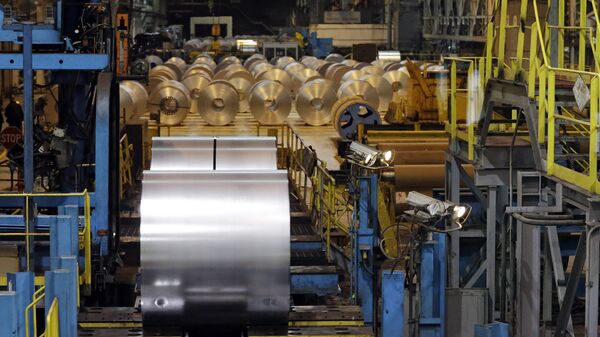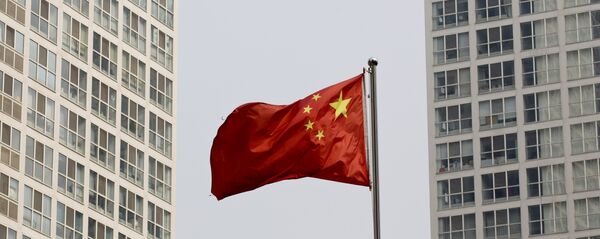Sputnik: Mr. Mikuriya, during the WCO Europe Region Heads of Customs Conference opening in Sochi, you mentioned that G20 ordered WCO to conduct a study on magnitude of illicit financial flows. When do you expect to present it?
Mikuriya: The G20 said that the major source of illicit financial flows could be customs fraud by using mis-invoicing, it is falsification of invoice. This is why they have tasked WCO to come back with a study. We have been working with many research institutes to consolidate outcome. We are now finalizing it. I expect that in Buenos Aires we can release what we have done and fulfill what they have tasked us. At the end of June, we will have a WCO consultation, so we have to present this to our members for their comments, then validate it and then send it to G20.
READ MORE: 'Strategic Partner' US Knocks on WTO's Door Over India's Trade Policy
Sputnik: When you talk about illicit financial flows, is it only customs fraud or are there any other issues, such as terrorist funding?
Mikuriya: The major concern of the illicit financial flow is the anticorruption issue, but also it could be terrorist funding, money laundering. We are trying to find out what would be the magnitude of this, it is very difficult to grasp.
Mikuriya: It has been very positive. WTO asks WCO that when it comes to the implementation part, it is essentially WCO’s work. We have started our program, which is implementation support and more than 70 countries have already received our assistance and there is a growing request, so we are addressing that. On May 2-3, there will be a WTO meeting of the trade facilitation committee and in the past they have been discussing internal arrangement. Finally, they want to discuss circumstances of trade facilitation — where they need the WCO to come and discuss together what progress has been made and how we can help members to implement the agreement.
Sputnik: It is a great timing for a meeting on trade facilitation between WTO and WCO, considering US President Donald Trump signed an order to impose 25-percent tariffs for steel imports and 10-percent for aluminum imports for national security reasons. In your opinion, can this issue be settled at such a platform?
Mikuriya: Yes, [about] the US president, it’s a political decision which should be dealt with at a political forum. I think G20 can be used, because WTO is too difficult. I hope there is sufficient willingness to be more constructive and positive about trade. What we can show is trade is important and on the ground we continue to cooperate whatever political decision is made. Facilitating trade and cooperation is the key.
READ MORE: New US Tariffs Violate WTO Rules by Targeting China’s Future Industries
Sputnik: And what are the main international trade challenges now? How is WCO currently dealing with them?
Mikuriya: First international trade challenge is E-Commerce. Traditional trade is by containers, but now small parcels and cross-border goods are there. Therefore, we need a platform solution to address that. This is also where Russia has been very helpful. Russia also sees that it is important. Of course, other major economies and developing countries see the future of trade more go into containerization to parcelization to parcels. It’s essentially a good thing that consumers and small- and medium-size enterprises could participate in global trade.
Mikuriya: We are helping both the UK and and EU, it is still under negotiation. In the end, whether there will be any trade agreement or not, is part of the negotiation tactics. I put it more in perspective of negotiation. Some say losses are huge, others say it’s manageable, but we won’t enter that discussion, we are practical. It’s too early to predict, because there are several figures. We are waiting for the UK and the EU to identify and then we can offer any assistance with the best of practice.
Sputnik: What kind of assistance could it be? Did WCO already offer their help to the UK and the EU?
Mikuriya: What kind of best practice is there, especially using technology… I already had a talk with the UK and offered [the help]. The UK appreciates that.
Sputnik: Some WCO members have been discussing how the Doing Business rating should be updated for the assessment of the work of customs organizations. How do you assess the Doing Business rating? Is it reliable or should a new method of assessment be created for customs organizations?
Mikuriya: World Bank has been doing a Doing Business rating and many customs administrations are not happy, because they see problem of data collection, methodology and lack of communication. This is being addressed and World Bank also recognizes that they need to have more constructive engagement with the customs. You can’t address that overnight, but gradually we are constructing trust between World Bank, the Doing Business team and customs administrations. It affects business and investment climates… so it is really important for us to bring World Bank to a real world and provide a better business environment.
READ MORE: China Initiates WTO Dispute Over US Steel Tariffs — Commerce Ministry
Sputnik: Did you already communicate your view on the Doing Business rating to World Bank?
Mikuriya: The problem of Doing Business is ranking and people are very sensitive about that. This is why we said ‘if you want to continue ranking, you have to be very objective’. They want to look into our survey outcome and improve their own survey. Replacement is difficult, nobody likes rating and rather than creating another ranking, how we can improve the existing ranking is more important, because World Bank and Doing Business is well-regarded and listened, so rather than creating a new one, perhaps the first step is to jointly improve World Bank’s survey and then we’ll see what is the next step.
Views and opinions expressed in this article are those of the contributor and do not necessarily reflect those of Sputnik.



